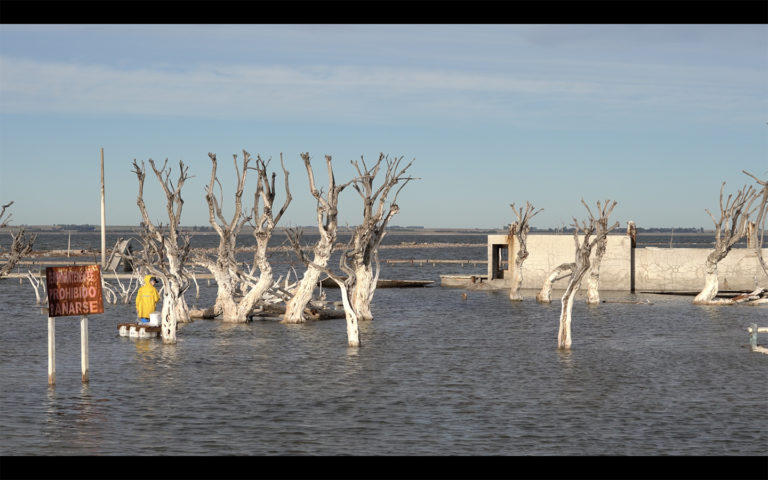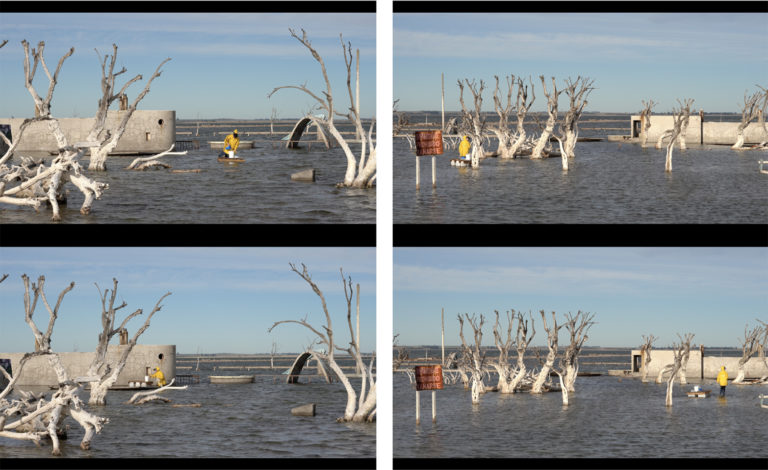Proyecto realizado en el contexto de la residencia Epecuén durante April-Mayo 2019 en Villa Lago Epecuén (Provincia de Buenos Aires, Argentina),
poblado turístico que sufrió una inundación en 1985 y se mantuvo sumergido 20 años bajo lagunas de sal.
Posteriormente exhibido en Galería Ambos Mundos (Buenos Aires, Argentina).
___________________________________________________________________________________________________________________________________________
I. Busqué la definición de «Ruina» en el diccionario. Ruina, la acción de caer o destruirse algo; destrozo, perdición, decadencia, decaimiento; pérdida grande de los bienes de fortuna (RAE, 2019). Me interesa principalmente esta última; nos arruinamos, perdemos nuestra fortuna, nuestros bienes, nuestras riquezas. La sal, la única roca comestible por el ser humano. Nuestra lengua tiene lugares específicos sólo para identificar y percibir su sabor. Símbolo de poder económico, por mucho tiempo bien preciado y escaso. Sus propiedades extraordinarias para la conservación en el tiempo de la materia orgánica, también considerada su alta presencia en el agua de potencialidades terapéuticas.
Nos arruinamos, perdemos nuestros bienes.
II. Las lágrimas tienen un alto porcentaje de sal. Nuestro cuerpo tiene un alto porcentaje de sal. Existen tres tipos de lágrimas, las terceras de la lista son aún incomprensibles en cuánto a su función, pero existen teorías, como en todo. Nuestros ojos lloran imperceptiblemente todo el día para hidratar, también lloran ocasionalmente frente a amenazas alérgicas, para proteger.
Pero en este tercer estadio, lloran y olvidamos que son los ojos. Se desbordan. Llora todo el cuerpo. Se nos escapa el agua, la sal, la respiración, los párpados, la espalda; para buscar empatía, para dar señales, para hacer catarsis o quién sabe para qué. La poca practicidad de algunos actos inevitables que buscamos justificar como podemos. Lloramos y nos sentimos mal, pero luego de unas horas nos sentimos mejor. A veces mejor que antes de llorar.
Lloramos, perdemos nuestra sal.
III. Soñé con una inundación. Lo soñé mientras viajaba en un bus. El agua invadía todo; los muros, las esquinas, los pensamientos. Ladrillos de panderetas sumergidos en el flujo imparable, holográfico. Era hermoso. Desperté y musité: «Sobrevivimos», desde una inercia somnolienta. Esto fue hace dos días y no dejo de pensar en que la belleza puede ser terrible, la ruina puede ser extrañamente tranquilizadora, y el sobrevivir inevitable, un suspiro de agua. Sobrevivimos a los años, el viento, el sol, a nuestras lágrimas, los silencios incómodos, los golpes, los cambios y al espacio entre una inhalación y una exhalación. Sobrevivimos aún cuando estamos muertos, a veces, en las historias y en la sal de otros.
Sobrevivimos, nos inundamos.

